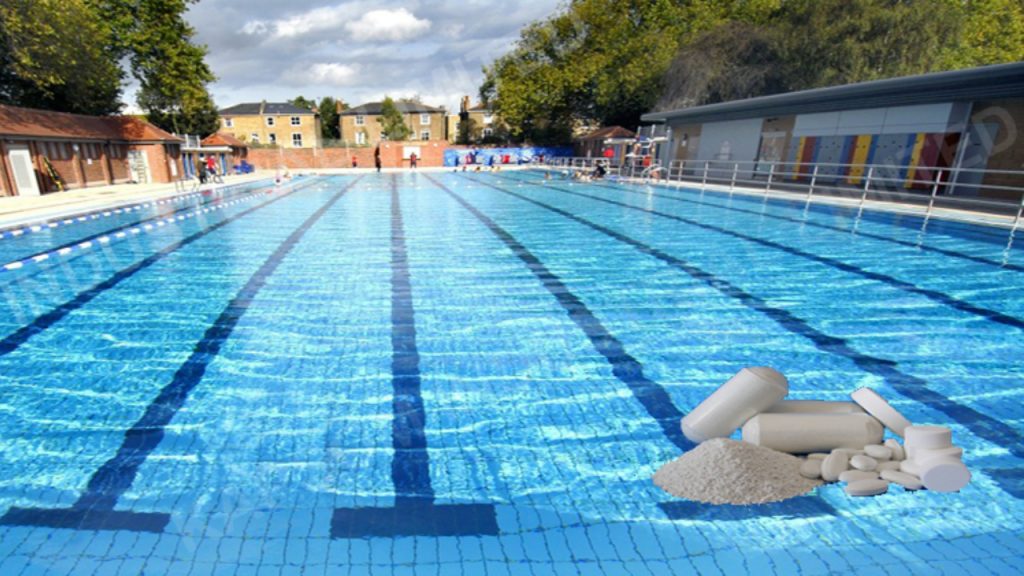Overview
As the name implies TCCA (TRYCHLOROISOCYANURIC ACID), we use them to clean swimming pools. We make those chemicals from pure and natural ingredients. These chemicals are highly successful in effectively purifying pool water and maintaining hygienic standards by removing pollutants from the water. These compounds are highly in demand in the market due to their high ph-value and prolonged shelf life. Swimming pool cleanliness is critical for maintaining healthy conditions in pools, hot tubs, plunge pools, and other recreational water facilities. We need to do proper sanitation to keep the water clear and avoid the spread of waterborne infectious diseases.
Jateen Trading Co. has the largest selection of high-quality chemicals for keeping swimming pool water clean and clear. Chlorine-donating chemicals, high-level algicides, sophisticated pH balancers, and also flocculating agents are among the products available.
Trichloroisocyanuric Acid
We use Trichloroisocyanuric Acid (TCCA) mainly in swimming pools as a disinfectant, algaecide, and bactericide.
We also use them in the textile sector as a bleaching agent. Moreover, we often use them in municipal sanitation for pools and spas. In addition, they are used in animal husbandry and fisheries for illness prevention and treatment. They can also be used for fruit and vegetable preservation, wastewater treatment, algicide for recycled water in industry and air conditioning, seed treatment, and organic chemical synthesis, in addition to the above uses.
TCCA has been shown to be a superior and also more cost-effective alternative to bleaching powder and sodium hypochlorite for all types of chlorination applications.
Properties

We are listing below some of its properties:
- Chemical Name: Trichloroisocyanuric acid
- Formula: C3O3N3Cl3
- CAS Number: 87-90-1
- Molecular Weight: 232.44
- Appearance: white powder or granules
- Effective chlorine: >90.0%
- PH (1% soln): 2.7 to 3.3
- Moisture: 0.5% max
- Solubility at 25 C: 1.2 (gm / 100 gm water)
Chemistry of TCCA
TCCA is transform to hypochlorous acid (HOCL) after hydrolizing in water. HOCL has a high microbiological activity. Cyanuric acid, a by-product of hydrolysis, acts as a stabiliser, and also as a preventing hypochlorous acid from being transformed into a hypochlorite ion (OCL-). Due to the sunlight and heat, this has little microbiological activity.
Advantage
TCCA’s benefits include the following:
- Source of chlorine that is both cost-effective and reliable
- It’s simple to use, ship, store, and also to apply. Save money on pricey dosing equipment.
- No white turbidity (as with bleaching powder)
- Long sterilization action
- Storage stabilityor in other words they have a long shelf life
Applications
- Disinfection of municipal sewage and wastewater
- Swimming pool disinfection
- Pre-treatment of industrial water for disinfection
- For cooling water systems, we use an oxidizing microbiocide.
- Plant protection and animal husbandry
- Woolens and battery materials can use it as an anti-shrink agents.
- Moreover, we use them in distilleries as a deodorizer
- Horticulture and aquaculture sectors use it as a preservative.
Precaution
Trichloroisocyanuric acid is a chemical compound having the formula Trichloroisocyanuric acid (C3Cl3N3O3). It’s a disinfectant, bleaching agent, and also an organic synthesis reagent. This white crystalline powder with a strong “chlorine odour” is sometimes supplied as a pill or granule for home and industrial use. Trichloroisocyanurates are the salts of trichloroisocyanuric acid.
When you’re not using it, keep the container tightly closed. Keep away from fire and heat in a cool, dry, well-ventilated location. When handling TCCA, wear dry, and clean clothes. Moreover, try to keep dust out of your lungs and eyes, as well as your skin. Its better to wear safety eye-wear and rubber or plastic gloves.
The presence of more TCCA in pool water is mostly linked to a lower pH level. Because swimmers’ teeth erode at this low pH, TCCA must be used in moderation to keep the pH stable.
Bottom Line
For swimming pools, TCCA is quite effective. It has a chlorine content of 90%, which is ideal for large pools. It is stable, and unlike other halogen compounds, it does not strip. During the day, this helps to minimize chlorine loss. Trichloroisocyanuric acid, when used in swimming pools, helps prevent algae and other unwanted organisms from growing. It provides for measured dosing of chlorine because it dissolves slowly in water, especially when in tablet form.
Do you find this article interesting? Then please check out the rest of the blogs too. We’re sure that you’ll find them fascinating and valuable as well. Check out our product page if you’re looking for high-quality TCCA. You can also find more chemicals for industrial use. You can learn more about us and our services by visiting our website. If you have any questions, please don’t hesitate to contact us; we’d love to hear from you!


